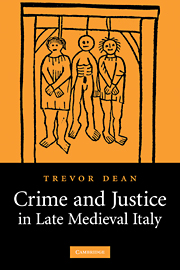5 - Consilia
Published online by Cambridge University Press: 23 July 2009
Summary
In the later Middle Ages, academic lawyers produced thousands of ‘learned opinions’ (consilia) on legal cases currently before judges. These opinions might be requested by the judge himself, by another official, or by one of the parties involved. The practice of seeking learned counsel was apparently impelled partly by pressures on the judge (as someone inexperienced in local law, he needed advice; as an employee subject to end-of-term appraisal, he needed to be able to defend his decisions) and partly by pressures on the parties (by ensuring a well-grounded outcome, consilia reduced costs and speeded up trials). The practice started to become frequent from the middle of the thirteenth century, and then accelerated in the fourteenth, with collections of consilia also starting to circulate. The most prolific consultant, Baldus de Ubaldis of Perugia (d. 1400), produced over 2,000 consilia.
Legal historians often extol the value of consilia as a source: one speaks of them having ‘remarkable potential’, another of their ‘immeasurable value’. A third writes of their ‘extraordinary capacity to represent an infinite variety of situations originating in everyday life’. The jurist, it has been said, worked with his hands on the law and his eyes on society, and therein lies his value to historians. Yet the potential is rarely realised, least of all in the field of criminal justice. There are many reasons for this, some relating to the nature of the consilia themselves, some to how legal historians use them.
- Type
- Chapter
- Information
- Crime and Justice in Late Medieval Italy , pp. 95 - 110Publisher: Cambridge University PressPrint publication year: 2007



